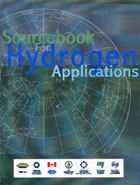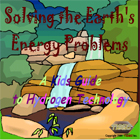
 Enter HyVIEW™
Enter HyVIEW™
Quick Links
| Why Hydrogen?Energy System ChallengesThe Perfect Fuel?What's Happening?Who can Help? |
Energy System Challenges
The Fossil Fuel Legacy
The dawn of the new millennium is an environmental milestone. During the twentieth century, the temperature rose by 0.3 to 0.6ºC , the sea level by 10 to 25 cm, and rainfall by 1% globally. The rate of temperature change is now faster than it has ever been during the past 10,000 years.
Many scientists believe that global warming and its consequences are due in large part to our use of carbon-rich fuel through the greenhouse effect. The primary greenhouse gas emitted by human activities is carbon dioxide (CO2); the second most important is methane.
The largest source of CO2 and of overall greenhouse gases in the US is fossil fuel combustion. In North America, cars account for nearly half the oil consumed, about half the urban pollution and one fourth the greenhouse gases.
Alarming Trends
The atmospheric concentration of greenhouse gases is 30% higher than it was at the beginning of the industrial revolution. If this trend continues, concentrations of greenhouse gases will reach twice today's level by 2100. As a result, the Intergovernmental Panel on Climate Change (IPCC) projects a temperature increase of 1 to 3.5ºC and a sea level rise of 15 to 95 cm over the next century, as well as a likely increase in precipitation intensity. Other pollutants emitted by burning fossil fuels are carbon monoxide, nitrogen oxides, volatile organic compounds and particulate matter.
Carbon monoxide is toxic to human beings. Nitrogen oxides, emitted by all internal combustion engines, are the key ingredient in the formation of smog, which is detrimental to human health, causing lung damage and eye irritation. Volatile hydrocarbons contribute to ozone formation and thus to smog. Particulate matter may cause lung damage. While fossil fuels have driven industrial and social progress over the millennia, they have left us with rapidly accumulating environmental damage. It is timely and even urgent to change how we fuel society.
Environmental Impacts
Both natural ecosystems and our socioeconomic systems are sensitive to the magnitude and rate of climate change. These expected changes may potentially disrupt our economy and our quality of life through:
- Increased health problems due to heat and disease.
- Stresses to our food and fresh water supply in some places.
- Human habitat reduction in regions vulnerable to sea level rise.
- Reduction of bio-diversity due to degradation of natural ecosystems.
Changes in temperature, precipitation, moisture and sea-level add major stresses to ecological and socioeconomic systems that are already affected by pollution, non-sustainable practices and increasing resource extraction. Reduced bio-diversity has an impact on the goods and services ecosystems provide to society such as pharmaceuticals and recreational areas. Urban pollution is already a costly problem to health and property: some cities such as Mexico City must now restrict the use of vehicles to curtail pollution. These situations can only accelerate as the economic standard of living of the emerging economies of China, India and others increases.
National Energy Security
The industrialized nations are energy intensive to meet both industrial and lifestyle energy requirements. They are highly dependent on foreign oil imports to meet these energy needs. Hydrogen and companion fuel cell technologies have the potential to reduce the dependence on foreign oil using hydrogen produced from domestically available primary sources including fossil fuels but also ing up sources for renewables such as wind and hydro power and nuclear power. Hydrogen brings a flexibility and opportunities to use local sources and reduce the dependence on foreign countries and the economic and political uncertainties associated with international trade.

